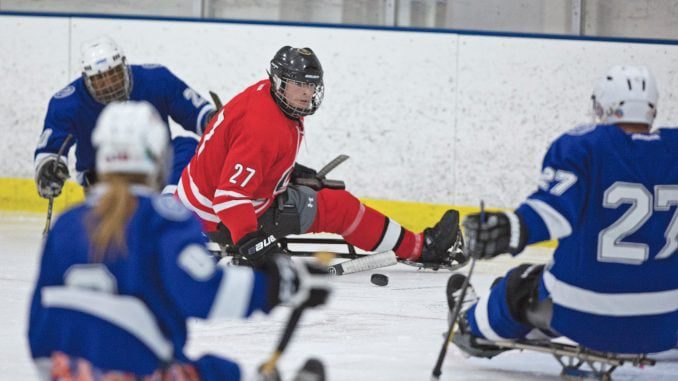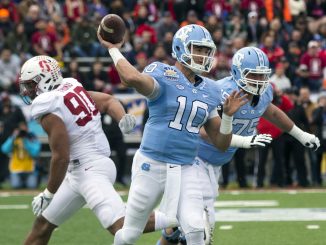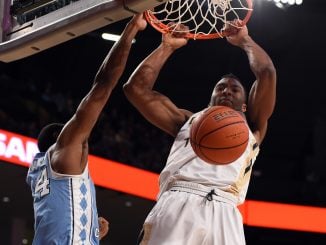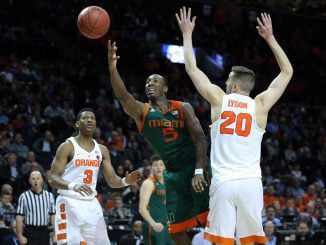
RALEIGH — Flip to page 130 of Sports Illustrated’s Sept. 17, 1990, issue and you’ll find Brant Ireland of University Heights, Ohio. Highlighted in the magazine’s weekly “Faces In The Crowd” feature, the smiling 11-year-old is lauded for his standout performance as a Little Leaguer, batting .698 and owning a 3-0 record with a 0.00 ERA pitching for his 16-0 team.
More than 26 years later, Ireland is fresh off the ice following the Carolina Sled Hockey Team’s 8-0 win in the March 10 opening game of the 2017 Carolina Sled Classic. His hair is perhaps grayer than the average 37-year-old, but his sculpted frame is one you’d expect from a lifelong athlete half his age.

It’s easy to get drawn in to his wide smile — the same one from the SI photo — and then his broad chest and flexed biceps. His prosthetic left leg, about a year old, is fastened to his thigh just above where his knee used to be.
“The minute I got in the sled it was like I’m in love,” Ireland said. “Just a new passion. And it came along at a very important time for me because it was about two months after my amputation and I was in a pretty low, dark place.”
Ireland, a sergeant first class in the Army who lost his leg in Afghanistan, has been playing sled hockey for nearly a year, part of the Carolina Sled Hockey Team — aptly named the Hurricanes — that is made up of more than a dozen players who found their way to the sport due to their disabilities.
Joe Ribar, the team’s volunteer coach, said his players became disabled in varying ways.
Several, like Ireland, were combat-wounded during military service. “Wolf” Hulsander, a wheelchair-bound man from Greenville with a Santa-esque beard and hair, lost both his legs in an industrial accident. Tyler Jacoby, a month shy of 14 and not yet a full-time member of the adult team, was born with spina bifida and has never had use of his legs. Other players suffered spinal cord injuries. Goalie Steve Fortin, who earned the shutout in the tournament’s first game, lost a leg to cancer.

“The level of their injuries are all different,” said Ribar, who is able-bodied and plays in a men’s ice hockey league when he’s not coaching sled hockey. “I’ve got one guy who, it’s only his ankle that’s pretty messed up. So everything else is normal, but because he’s disabled from his ankle he’s able to play.”
When the players strap into their sleds — which feature two blades that can be closer or farther apart depending on the player’s skill level — they transform into elite athletes, propelling themselves around the ice with a one-third-sized stick in each hand with a pick on the butt end to dig in and push off the ice.
“As the levels progress, the differences between sled hockey and real hockey basically goes away,” Ribar said.
And for Ireland, so do the insecurities of learning to live with one leg.
“It’s really not only fun but motivational,” said Ireland, who was introduced to sled hockey during his rehabilitation in San Antonio. “Every guy in here you look at and see the effort they put in just to get on the ice and get on their sled. And when they’re on their sled and they first get on the ice, the joy — it’s almost like you can see through their helmet just a smile. That’s amazing to see.”
Ireland moved from Ohio to Minnesota during his freshman year of high school and enjoyed watching hockey, but all the other kids had a head start on him — “They had been skating since they were 2 years old” — so he played basketball.
From early baseball accolades to teenage basketball to now, Ireland has found happiness in competitive sports.
“I grew up an athlete,” he said. “Everything I thought about [after the amputation] — I can’t do that anymore. I can’t do this anymore. So I was pretty down.”
Tim Nelson and his team, the Atlanta Sparks, drove six hours for the tournament. Nelson was exposed to the sport after meeting the sled team’s founder at a minor league game.
“He invited me to come out and play hockey,” Nelson said. “I said, ‘What are you talking about? I grew up in Georgia. That’s not what we do down here. There’s not much ice.'”
Once he started playing, he realized the games have an NHL-like intensity with checking (the only rule to hitting is not to hit with the front of the sled) and speeds — both the sled and the shot pucks — that rival a normal hockey game.
“That’s probably the best part of it,” said Nelson, who suffered a spinal cord injury in an accident and is paralyzed from the waist down. “It’s a physical, competitive game and you get to get in some exercise.”
The chance to compete that might not otherwise be unavailable to them is motivating for all the players.
“Especially for the military guys,” Ribar said. “They get to go out and basically be part of a team again and hit things. So that’s a selling point for them.”
Carolina Hurricanes public address announcer Wade Minter was on the mic for tournament weekend, announcing starting lineups and goals with the same flourish he does at PNC Arena. After starting off announcing one game at last season’s tournament, Minter was hooked.
“I came in, did one, and was so impressed with the sport and the teams that I immediately dropped most of my plans for the weekend and announced nearly the whole thing,” said Minter, who again pulled a full weekend as the voice of the tournament. “I heard from the tournament that many players considered having the PA and music one of the highlights of the weekend for them — one player even cried a little when they heard their name announced after scoring a goal.”
A weekend of games that started with a ceremonial puck drop by former Carolina Hurricanes forward and member of the 2006 Stanley Cup team Erik Cole ended when the host Hurricanes fell short with a 1-0 loss in the final to a team from the Space Coast region of Florida. Ireland said there final “felt like a 10-0 loss. They dominated the game.”
It just serves as more motivation, a competitive passion Ireland and his teammates probably thought wasn’t available to them.
“I’m not going to say sled hockey saved my life,” Ireland said. “But it sure brought a lot of me back.”



